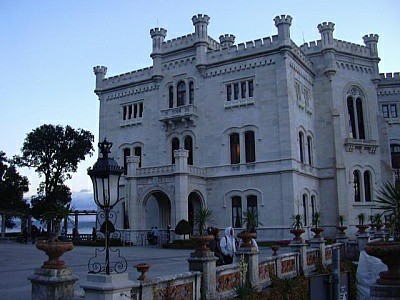[亨利梅因:国际法Lecture6]LECTURE VI. THE DECLARATION OF PARIS.One point of considerable interest in International Law is the very different degree of durability which the various parts...+阅读
LECTURE IX. RULES AS TO PRISONERS AND QUARTER.
At the close of my last lecture I spoke of the Geneva Convention of 1864 as the farthest, as well as the most recent, point of advance reached by a concert of nations in the attempt to mitigate the inevitable sufferings of war. International Law, as now understood, contains a number of rules of greater antiquity hing the same object in view. The status of the prisoner of war is historically descended from the status of the sle. He represents the class which, as the Romans put it, had lost liberty, country, and family; by capture he had forfeited to the captor all the rights which he possessed, and was bound to labour at the order of the captor, and anybody who succeeded the captor in title, to the end of his life. But as slery fell into disrepute and decay chiefly owing to the influence of the Christian Church, a number of rules gradually grew up for the purpose of limiting the power of the captor over the prisoner of war. They may be described as intended to prevent his being treated actually as a sle, in the form which they he now taken. In the Manuals which several of the great civilised states he prepared for their officers in the field, it is declared that the object of detaining prisoners of war is to prevent their taking part again in the operations of war. So much restraint, therefore, and no more, should be applied as is sufficient for that purpose. They cannot be pelled to aid their captors in military operations, but they may be employed in any other manner suitable to their condition. The money which they earn by work should be placed to their credit after deducting the expenses of subsistence. A prisoner of war who has mitted an offense against the customs of war —— such, for example, as stabbing or robbing wounded men —— may be considered to he forfeited the character of a prisoner of war, and be punished with death for his crime. The primary obligation to support prisoners of war necessarily lies with the captor, and he should maintain them in a manner suitable to their condition. A prisoner of war, unless he has given a pledge or promise not to escape, is justified in making the attempt; but if retaken he is not punishable by death, or otherwise, for hing made the attempt, as the customs of war do not regard an attempt to escape on the part of a prisoner as a crime. On the other hand, a rising amongst prisoners of war with a view to effect a general escape may be rigorously punished, even with death in the case of absolute necessity, as self-security is the law of the conqueror, and the customs of war justify the use of means necessary to that end. Stricter means of confinement may be used after an unsuccessful attempt to escape. But a prisoner of war cannot be ill treated or punished for refusing to give information as to the forces to which he belonged, or for giving false information. It has happened in modern days that after great wars, or where munication between the belligerents was possible during them, serious plaints he been made of the imperfect discharge of the obligatious imposed by International Law or by usage on a captor holding a captive in duress. At the close of the War of Secession between the Northern and Southern sections of the United States, the Northern armies obtained possession of the person of a Confederate officer who had been in charge of the prisoners taken by the Confederates during the war. He had been accused of barbarous cruelties towards his enemies who were captives, and the Northern army, after a trial which on the other side was charged with every kind of carelessness and irregularity, put him to death by hanging. The English Government was, at the beginning of this century and the end of the last, constantly accused of barbarity towards the French prisoners who were detained in the hulks at Portsmouth and other ports; and probably to this day it is a monplace amongst the French that this is one of the greatest crimes which the English he perpetrated against themselves. England was in reality in great difficulties in providing places of confinement for the prisoners through the want or scarcity of such places in this country, and in the last part of the struggle the Emperor Napoleon I. is now known to he been indisposed to facilitate exchange of prisoners between the two countries. Gathering his vast armies not only from France, but practically from the whole of the Continent, he looked with little four on anything that would add to the numbers of the British army, which he believed to be smaller than it really was, or on anything that would increase the extent of his own overgrown forces. Still it is probable that both in the War of Secession, and in the French and English war at the beginning of the century, too little tenderness was shown to prisoners; and I hope that with the emphatic expressions which are contained in the new Manuals, and which will henceforward give the law in the field, there will be no reason in the future to make a grievance of the treatment of prisoners of war. The only plete mitigation of the misfortune of captivity is, of course, to be found either in the escape of the prisoner, on which I he said a few words, or else in some rules which should authorise his discharge from the captive condition. In all probability these methods of releasing prisoners are all descended from the system of ransom now extinct. One result of the theory that the captive had bee a sle was, naturally, that if he were able he might pay to his captor such a price as would induce him to release what had bee his own property. Very large Bums of money seem to he been exacted in the Middle Ages as the ransom of a mailed knight when taken prisoner. He was usually a man of birth and of wealth; but as he lost his relative importance, and as the most effective part of armies came to consist of the men-at-arms, and afterwards of mercenary troops carrying

a new class of weapons, a number of rules present themselves which are intended to facilitate the voluntary discharge of the bulk of the prisoners. After the battle of Poitiers it is expressly stated that there were so many prisoners taken as to make it necessary to discharge the knights, debiting them with the amount of their ransom and not at once exacting it; and that the rest of the captives, whose number was very great indeed, were exchanged.
Exchange has now bee one of the regular customs of war, and one of the most humane and beneficial, and much disrepute is usually incurred by the refusal to admit it. At the same time, while exchange, says the text of the Manuals which I he been citing, is the ordinary mode of releasing prisoners of war, a nation is not guilty of any actual breach of the customs of war in refusing to exchange its prisoners, and may detain them to the close of the war. Exchanges of prisoners take place number for number, rank for rank, wounded for wounded, with added conditions for added conditions, such, for instance, as not to serve for a particular period. In exchanging prisoners of war such numbers of persons of inferior rank may be substituted as an equivalent for one of superior rank as may be agreed upon, but the agreement requires the sanction of the Government or of the mander of the army in the field. A prisoner of war is in honour bound truly to state to the captor his rank, and he is not to assume a lower rank than belongs to him in order to cause a more advantageous exchange, nor a higher rank for the purpose of obtaining better treatment.
Prisoners of war are also not infrequently released through pledging their word to observe certain conditions imposed by the captor. A prisoner of war so pledging his word is said to give his parole, and if his parole be accepted by the captor, to be paroled. The usual pledge given with a parole is not to serve during the existing war. This pledge only extends to active service against the enemy. It does not refer to internal service, such as recruiting or drilling recruits, quelling civil motions, fighting against belligerents unconnected with the paroling belligerents, or the civil or the diplomatic service on which a paroled person may be employed. It is laid down by the legal authorities that paroling is a voluntary contract entered into between the parties. The captor is not obliged to over to parole a prisoner of war, and a prisoner of war cannot be pelled to give his parole, but may remain a captive. It is a rule that a list of the names of officers and men paroled should always be made in writing and be carefully kept. It is further a rule that a prisoner of war has no authority to pledge himself never again to serve against a particular enemy. The pledge must be confined to a limited time, as he cannot divest himself wholly of the duty which he owes to his sovereign and country. The right of a prisoner of war to give his parole may be still further limited by the laws of his own country. If a prisoner make an engagement which is not approved of by his own Government, he is bound to return and surrender himself to the enemy. As a general rule the manding officer has an implied authority to give his parole on behalf of himself and the officers and men under his mand; an inferior officer ought not to give parole either for himself or his men without the authority of a superior officer, if such an officer be within reach. And according to the English practice a state has no power to force its subjects to act contrary to their parole; but how far it is authorised to refuse such paroles, and to force its paroled subjects back into the enemy's lines, would seem to be in principle doubtful. As a general rule it would appear advisable to admit of the validity of the paroles, but to punish the individuals who he given them contrary to the laws of their country. A recaptured prisoner who has violated his parole may be punished with death; but the modern practice usually is to abstain from the infliction of death, except in an aggrated case, and to substitute strict confinement with severities and privations not cruel in their nature or degree.
These rules, which tend to ameliorate the condition and hopes of prisoners, are, relatively to the whole history of modern war, of ancient origin.
There is another set of rules, on which I propose to say something, which relate to the treatment of the general population of the enemy's country, and these are among the most modern parts of the International system. They constitute a subject of great interest but of very great difficulty; and indeed it was the attempt to construct a sort of code on this subject which brought the discussions of the Conference of Brussels to an end, and deprived its results, as a whole, of the authority which they otherwise might he possessed. How the questions involved arose I may perhaps best express in the following way: In all wars waged by armies of the modern type, and especially in the war between France and Germany, there arrives a point at which one side or the other may legitimately think that the campaign has ended fourably for him. In the Franco-German war we may say that this point was reached as soon as the German armies had invested Paris. But some of you can remember, and others may he read, what followed. Leon Gambetta, a principal member of the so-called Government of National Defence, escaped from Paris in a balloon and established a separate or branch Government at Tours. From that point a new campaign of a new nature may be said to he begun. Large forces were brought together by Gambetta, consisting chiefly of fragments of other armies which had been stationed in particular localities or had marched westwards after defeat from the Germans, and, besides these, of a great part of the hitherto unarmed population of the country called to his standard under what was called a levee en masse.
以下为关联文档:
亨利梅因:国际法Lecture14LECTURE XII. PROPOSALS TO ABATE WAR.To this last lecture of the present course, it seems to me desirable that I should briefly notice some assertions or suggest...

亨利梅因:国际法Lecture7LECTURE VII. THE MITIGATION OF WAR.The age in which International Law was born was an age of land wars. The wars of succession and of feudal ascendancy had par...

亨利梅因:国际法Lecture3LECTURE III. STATE SOVEREIGNTYI now propose to occupy you with a group of questions arising out of a subject of much interest and magnitude —— the Sovereignt...

亨利梅因:国际法Lecture4LECTURE IV. TERRITORIAL RIGHTS OF SOVEREIGNTY.All the department of International Law with which I was occupied at the close of my last lecture, the acquisition...

亨利梅因:国际法Lecture13LECTURE XI. RIGHTS OF CAPTURE BY LAND.In all modern books on this subject there is more or less distinct condemnation of unauthorized pillage by the soldiers o...

亨利梅因:国际法Lecture8LECTURE VIII. THE MODERN LAWS OF WAR.In my last lecture I explained the detestation which newly-invented instruments of war sometimes occasioned in olden days,...

亨利梅因:国际法Lecture11It is suggested by several of the international writers, and it is probable, that armistices first arose from the truce or truces of God which were repeatedly pro...

亨利梅因:国际法Lecture5LECTURE V. NAVAL OR MARITIME BELLIGERENCY.To sum up what I he been saying. I he been discussing certain legal fictions which are signified through legal metaph...

新东方背诵文选80篇:23亨利·福特HenryFord23 Henry Ford Although Henry Ford's name is closely associated with the concept of mass production, he should receive equal credit for introducing labor practic...



